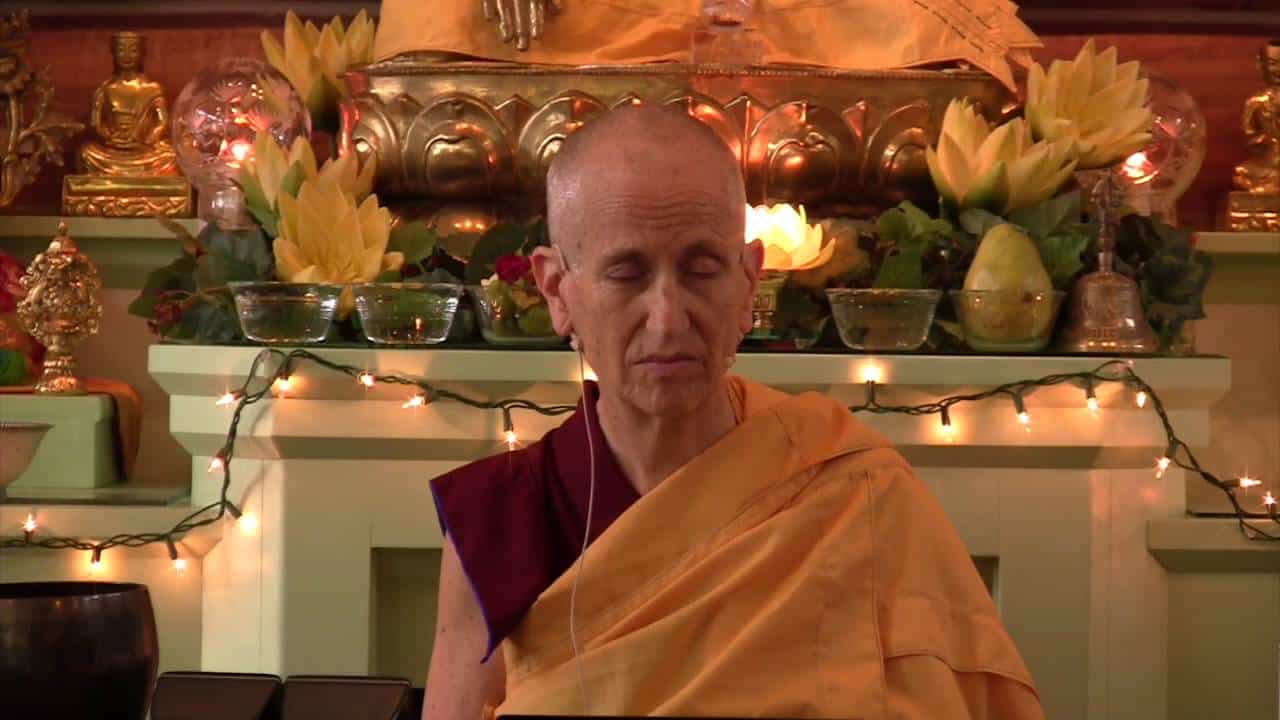How the afflictions arise
The text turns to training the mind on the stages of the path shared with intermediate level practitioners. Part of a series of teachings on the Gomchen Lamrim by Gomchen Ngawang Drakpa. Visit Gomchen Lamrim Study Guide for a full list of contemplation points for the series.
- The antidotes to the six root afflictions
- Two views on the sequence in which the afflictions arise
- According to Vasubandu and Asanga
- According to Chandrakirti and Dharmakirti
- The difference in the views of Buddhsim and science in how the afflictions arise
- The six triggers that make the afflictions manifest in our mind
Gomchen Lamrim 49: How the afflictions arise (download)
Contemplation points
The six root afflictions
Reflect on how the six root afflictions operate using current events:
- Venerable Chodron talked about some of the current US events: the killing of black citizens in Baton Rouge and St. Paul, and the attack on police officers in Dallas. Spend some time thinking about the six root afflictions that led up to actions done in each situation (attachment, anger, arrogance, ignorance, afflictive doubt, and afflicted views).
- How do you see these same six root afflictions operate in your own life?
- Consider that as long as those same afflictions are in our own mind-stream lying dormant, under conducive conditions (in this life or another), we could act in the very same way.
- Determine to stay focused on practicing the path, subduing the afflictions until you are able to eliminate them from your mind-stream altogether for the benefit of yourself and others.
Antidotes to the afflictions
Reflect on the specific antidotes to each of the root afflictions. Consider why these antidotes counter the affliction.
- Attachment: meditate on impermanence, meditate on the unattractiveness of the object, consider the disadvantages of attachment, play out the scene in your mind where you get everything you want… then what?
- Anger: meditate on fortitude, love, compassion and the disadvantages of anger.
- Arrogance: rejoicing in others’ good qualities, meditate on difficult topics, remember that everything we have and are comes from the kindness of others, consider that if you were the the best, we’d all be in trouble…
- Ignorance: for ignorance of ultimate truth, meditate on emptiness; for ignorance of conventional truth, meditate on dependent arising.
- Afflicted doubt: learn, reflect, and meditate, ask questions, think about the topic.
- View of a personal identity: meditate on the wisdom realizing emptiness.
- View of extremes: meditate on dependent arising and emptiness, and their compatibility.
- Holding wrong views as supreme: meditate to resolve the other views and realize that this one is also incorrect.
- View of rules and practices: meditate on karma and its effects, emptiness.
- Wrong view: meditate on topics you have wrong views about, apply your analytical wisdom.
Keep these antidotes handy, watch for afflictions to arise, and resolve to apply the antidotes as soon as possible.
Factors that trigger the afflictions
Venerable Chodron said that if we can understand the cause and conditions that give rise to our afflictions, we can work to eliminate our exposure and not fall under the sway of our afflictions so much. Let’s look at the 6 factors that trigger manifest afflictions…
- Latencies of the afflictions: Because the afflictions haven’t been removed from the mind, they can arise under the right conditions. Think about the seeds of afflictions in your own mind, how you can be fine one moment and in the next, anger or attachment is triggered. Do you see how that seed of affliction is what links the manifest affliction in the past to what arises in the moment? What is the one thing that can be done to eliminate the latencies of the afflictions?
- Contact with the object: We all have objects (can be people, places, ideas, etc) that spark our afflictions. What things trigger different afflictions in your own mind? What can you do to limit your exposure to things that trigger your afflictions?
- Detrimental influences: We are very influenced by the people around us. How do you see the influence of others (both positive and negative) in your own life? What can you do to promote relationships with people who encourage your aspirations for how you want to be in the world?
- Verbal stimuli: This includes books, magazines, film, social media, etc. How does media influence you personally? How does it influence your self-image and your consumer habits? How does it influence your ethical conduct? What can you do to limit access to media that doesn’t promote a healthy mind?
- Habitual ways of thinking: The more we are familiar with a certain perspective on things or a particular emotion, the more likely it is to arise. What emotional habits do you find yourself in? What can you do to interrupt these habits and create beneficial ones instead?
- Inappropriate attention: This is our mental screen-writer. It misinterprets, exaggerates and projects meaning and motivation. Look back on specific situations in your own life where inappropriate attention was active. How did it blow a situation out of proportion and allow for the arising of afflictions? What can you do to recognize and interrupt the factor of inappropriate attention?
Doing this contemplation helps us get to know ourselves and how our mind works. Resolve to watch for personal triggers, and eliminate or limit them where possible so as to reduce the arising of afflictions.
Venerable Thubten Chodron
Venerable Chodron emphasizes the practical application of Buddha’s teachings in our daily lives and is especially skilled at explaining them in ways easily understood and practiced by Westerners. She is well known for her warm, humorous, and lucid teachings. She was ordained as a Buddhist nun in 1977 by Kyabje Ling Rinpoche in Dharamsala, India, and in 1986 she received bhikshuni (full) ordination in Taiwan. Read her full bio.


